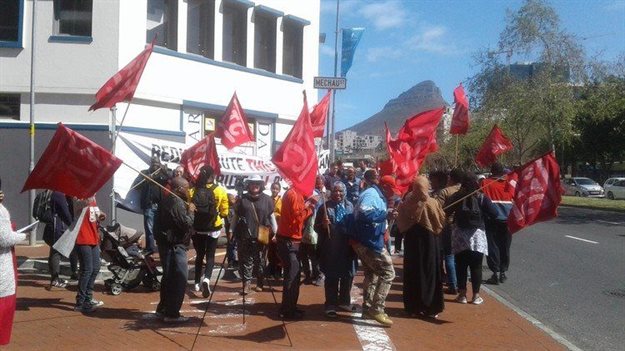Activist organisation and law centre Ndifuna Ukwazi (NU) has launched litigation in the Cape High Court to compel the City of Cape Town to develop a housing policy that would require new developments to include affordable housing.

Housing activists picket outside the location of a proposed new development called The Vogue in Cape Town’s city centre. Photo: Sandisiwe Shoba /GroundUp
To launch the litigation, about 30 NU and Reclaim the City members picketed outside a proposed new apartment development “The Vogue” on 7 Buitengracht street in the city centre.
According to NU attorney Jonty Cogger, the City approved the development but it does not include affordable housing units in its building plans. Cogger says it is just one example of numerous building developments the City has allowed although most Capetonians cannot afford to live in them.
“Ndifuna Ukwazi over the last two years has objected to about 50 development applications, and has argued that when the City approves private developments it has an obligation to transform the spatial apartheid by asking developers to include affordable housing in their developments,” said Cogger, adding that only 10% of Capetonians could afford to live in an inner-city building like The Vogue.
“We have conclusive evidence to show that even just the average residential unit, excludes 90% of Capetonians. That makes this development spatially unjust because it excludes historically marginalised people. It does not do anything to transform the apartheid-era city.”
The cheapest unit at The Vogue would cost +/- R1,213,800 to purchase.
Peter Adams, a 59 year-old Reclaim the City Member and resident of the occupation at Woodstock Hospital, believes that developers exploit poor people. “We do the dirty work, and they don’t want to give nothing back to the community,” he said.
The Vogue is a project by property developer FWJK.
According to FWJK CEO Dave Williams-Jones, inclusionary housing could not be incorporated into the 39-story development as it would be too expensive. “Affordable housing from a cost perspective is more appropriate in a four-storey walk up with on grade parking,” said Williams-Jones.
He also sent GroundUp a press statement on behalf of FWJK in which the company said that NU’s action was blocking employment opportunities.
“Ndifuna Nkwazi has yet again put thousands of jobs at risk in their latest attempt to stall the development of a new R1.4 billion mixed-use development by FWJK Developments in the Cape Town CBD, which was planned for construction commencement in the first quarter of 2020. In bringing their High Court action against the City and FWJK, they have potentially halted the construction of this project by up to three years,” the statement read.
In response, Cogger saw the employment argument as a distraction from the real issue of exclusionary housing.
“Developers use the threat of immediate jobs (often without evidence) to deflect from the fact that the approval of exclusive developments has far worse long-term threats to the sustainability of Cape Town," he said. “Where do the construction workers live, and could they realistically ever afford to live in the city?”
Williams-Jones also said that the high price of buying land has made it less cost-effective for property developers to include low-cost housing in their structures.
“The introduction of affordable housing into a high-rise development negatively affects the viability of the project and it is just not possible to develop on this basis.”
Cogger said NU is not against the development of Cape Town, but wants structures that promote a spatially just, equal and inclusive city.
“[We want] development that doesn’t make spatial division and segregation worse.”
Williams-Jones felt that affordable housing was a public sector issue that was being unfairly placed on the private sector.
The City of Cape Town declined to comment because it had not “been served with a notice of the review application”.
UPDATE on 16 September at 09:45: This article was updated with the City’s decision not to comment.
Shoba is a Daily Maverick intern who has been seconded to GroundUp for a month.
This article was orginally published on GroundUp.


































